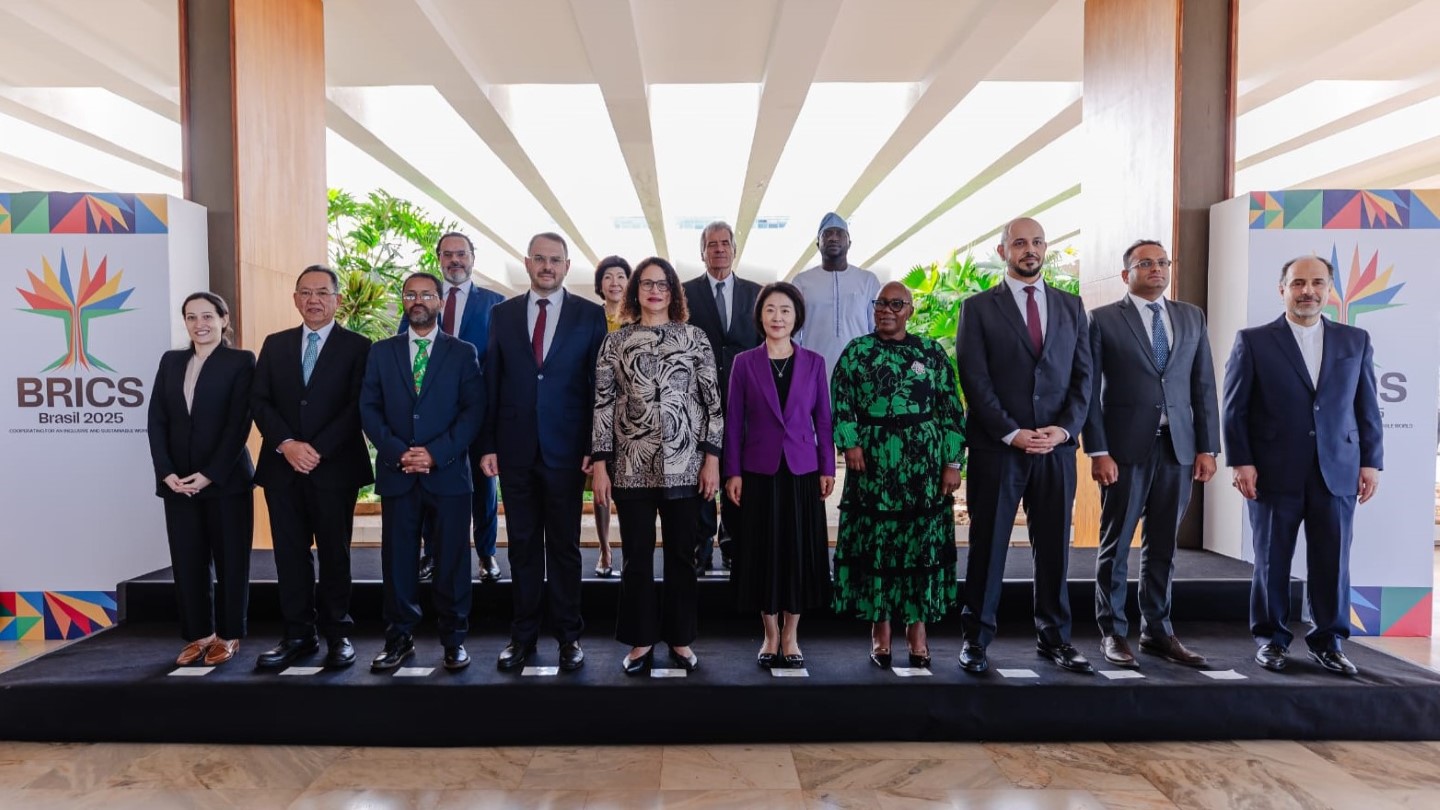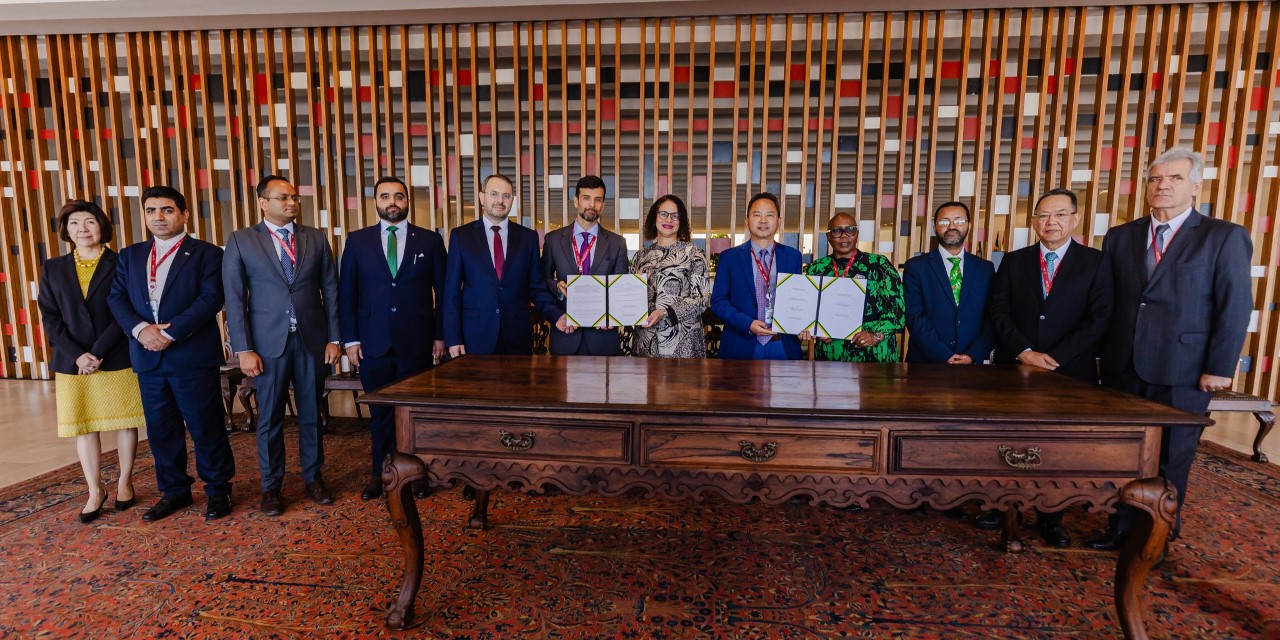BRICS Advocates for Global South Leadership in New Technologies and Innovation
A more equitable use of Artificial Intelligence (AI) is one example of these mechanisms. The group aims to share infrastructure for better use of technological tools and to create more accessible languages

Por Mayara Souto / BRICS Brasil
The ministers of the eleven BRICS member countries signed, this Wednesday (25), the Ministerial Declaration on Cooperation in Science, Technology and Innovation, during a meeting held at the Itamaraty Palace in Brasilia.
The document reinforces the importance of expanding access to and mastery of technologies and innovations by countries of the Global South—resources that have traditionally been concentrated in the Global North. The declaration also sets forth the expansion of cooperation among member states to create more accessible technological languages and infrastructure that enables the exploration of new tools, such as Artificial Intelligence (AI).
“All new technologies have the potential to further widen the asymmetries between countries, because they are extremely powerful tools that transform modes of production and productive forces,” explained Brasil’s Minister of Science, Technology, and Innovation, Luciana Santos. “We are fighting to prevent a concentration of technology in just a few countries and to ensure it can be shared. In this sense, all of our countries are working to develop their own infrastructure that ensures the advancement of artificial intelligence.”
Regarding the so-called Large Language Models (LLMs), Minister Santos warned of the risks of cultural bias in these models when they are not adapted to local realities. She emphasized the importance of Brasil developing its own technological solutions, rooted in national identity and context:
“This alone already introduces a cultural bias that misrepresents nations—it does not reflect the context, culture, history, or way of life of each country. That’s why we are working to develop our own language models in Portuguese. Some powerful models are already in development, such as the one from Piauí, which leads the ‘SoberanIA’ initiative with 100 billion parameters, showing that we are on the right path,” the minister explained.
LLMs are AI systems that enable the understanding and generation of natural language, simulating writing and speech. The number of parameters is what makes this language more complex and comprehensive. For example, ChatGPT models have around 220 billion parameters.
“AI is the way forward. We are not on the same level as other countries, but we are saying that we can form partnerships and grow through the experiences that are here to be shared. Each country participated in the session by presenting its political status to explain what they have in terms of policy. This is a moment where we discuss how each of us can grow and learn from one another so we can all advance together in this regard,” summarized Nomalungelo Gina, South Africa’s Deputy Minister of Science and Technology.

Innovation
The Ministerial Declaration on Science and Technology also endorsed the BRICS Innovation Action Plan 2025–2030, prepared by the Working Group on Science, Technology, Innovation, and Entrepreneurship (STIEP) during a meeting held in Rio de Janeiro on June 10–11. “Innovation is always the effort to ensure that scientific production results in products and services. So, in this process, there is an exchange of tools and legal instruments available in each country,” commented Luciana Santos.
The importance of innovation was also emphasized by Deputy Minister Nomalungelo Gina, who advocated for its central role in the development of Global South nations. “We have shared our experiences on how we are investing in the growth of innovation, bearing in mind that when it comes to our country’s economic growth and stability, everything is rooted in innovation,” she stated.
She added that during the group’s meetings, topics such as industrialization, education, and skills development were discussed, along with ways to exchange information and resources to address shared challenges, such as climate change. “Innovation can contribute to energy issues and the challenges we face. Analyzing and addressing energy issues allows us to attract innovation to climate issues, such as green hydrogen,” added the South African representative, pointing to solutions for reducing greenhouse gas emissions.
A decade of cooperation
This year marks the tenth anniversary of the BRICS Memorandum of Understanding on Cooperation in Science, Technology, and Innovation, signed by the ministers responsible for these areas in the member countries.
This BRICS group on science, technology, and innovation—comprising ministers and the representatives present here—has carried out intense work. It has now been ten years of cooperation under this framework and through BRICS. We have 14 Working Groups on Science, Technology, and Innovation, ranging from public calls for cooperation and researcher exchanges in networks to the sharing of infrastructure and pursuit of technology transfer, all grounded in collaboration, sharing, and dialogue, with the understanding that we all need to learn together,” celebrated Minister Luciana Santos.
So far, the BRICS S&T&I area has held nine editions of the Young Scientists Forum, seven editions of the Young Innovators Prize, and six joint research cooperation calls, bringing together hundreds of scientists and government representatives.
During the event, the expansion of the Memorandum was also signed, now including the new BRICS member, Indonesia, and additional partners such as Belarus, Bolivia, Cuba, Kazakhstan, Malaysia, Nigeria, Thailand, Uganda, Uzbekistan, and Vietnam.
Translated by Luana Ferreira de Freitas (POET/UFC)
Proofreading by Tadeu Azevedo (POET/UFC)